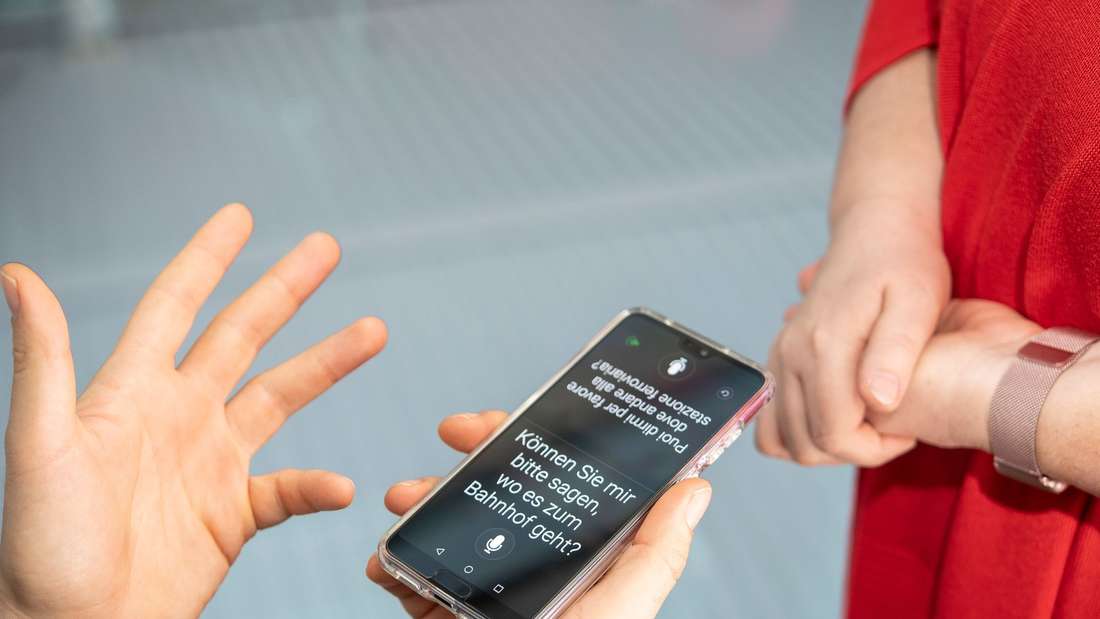Translator apps are suitable for everyday use

Do you speak Armenian, Kazakh or Punjabi? We neither. But many translator apps promise conversations worldwide despite language barriers. In practice, this sometimes produces strange results.
Berlin – When Martin Gobbin tried different translation apps for Stiftung Warentest, he got some creative results. “Blazing Dive” was one of them. One application had translated “blatant dive”, which means “obvious swallow”. According to Gobbin, it didn’t happen often that the software was so wrong, but it wasn’t an isolated case either.
Anyone who lands on a page in an unfamiliar language on the Internet or stands helplessly in front of a notice board on vacation has probably already used the help of translation software. Google translator is probably one of the best-known examples. Microsoft has the translator and Apple calls it iTranslate.
In addition, Pons also offers an app, Amazon has launched Sayhi, and then there is also Talkao or the translation shooting star Deepl.
Translations in over 150 languages
What the apps have in common is an extensive portfolio on the one hand and a certain susceptibility to errors on the other. Google offers translations in more than 150 languages, including Mongolian and Welsh.
Most apps advertise that they can also make spoken sentences understandable or translate pictures. This is especially helpful in countries with other characters, such as in Asia. For example, if you can’t read street signs or the menu.
“Translation programs that are freely available on the Internet can provide a reasonable service in everyday use,” says Réka Maret from the Federal Association of Interpreters and Translators (BDÜ). However, the height of fall is usually low here.
At worst, amusement
In the worst case, an unexpected dish ends up on the plate or you get an amused shake of the head when talking to the locals. “These systems do not master the languages like a human being, but only compare translated texts and their templates and spit out a result on this basis.”
New software like that of the Cologne company Deepl learns with the help of artificial intelligence what words and sentences mean in other languages. “Words are not only considered one after the other, but in a sentence context,” explains Janiça Hackenbuchner from the Institute for Translation at the Technical University of Cologne.
In some cases, a sentence is even considered in the context of the previous or following sentence, explains Hackenbuchner. This works quite well, and the apps can also translate a lot of text very quickly.
No app better than satisfactory
Nevertheless, the technology has its limits. In 2020, Stiftung Warentest rated none of the apps in Gobbin’s comparison better than satisfactory. “Of course, everything has improved a bit since then,” says the test editor.
But in addition to problems with ambiguous vocabulary, technical language or special terms from different areas, the software also has a hard time with humor or irony, Gobbin knows. “It becomes very difficult with figurative and poetic language or idioms.”
And there are also some question marks when it comes to data protection. Some of the apps, which are available for both Android and iOS, sent data to Facebook in the comparison of the product testers. Others wanted access to location or address book.
Another weakness is sexist or racist translations. “The programming itself is actually neutral,” explains Oliver Czulo, Professor of Translation Studies at the University of Leipzig. But the software learns from human data, i.e. real existing text material – and adopts corresponding patterns.
Unsuitable for professional use
An example: A “clever pianist” is sometimes translated from English as “clever pianist”. But a “beautiful pianist” becomes a “beautiful pianist”.
Where all the experts agree: the apps are hardly suitable for professional use. “I would never use a program to translate contracts or letters from the office,” says Gobbin.
“There are professional solutions for companies that also keep an eye on data protection,” adds Czulo – it’s better not to use a free app. And a dictionary is often the best solution for translating individual words, says Hackenbuchner. Whether online or offline. Because dictionaries offer many more suggestions including definitions and application examples. dpa
Reference-www.ingame.de